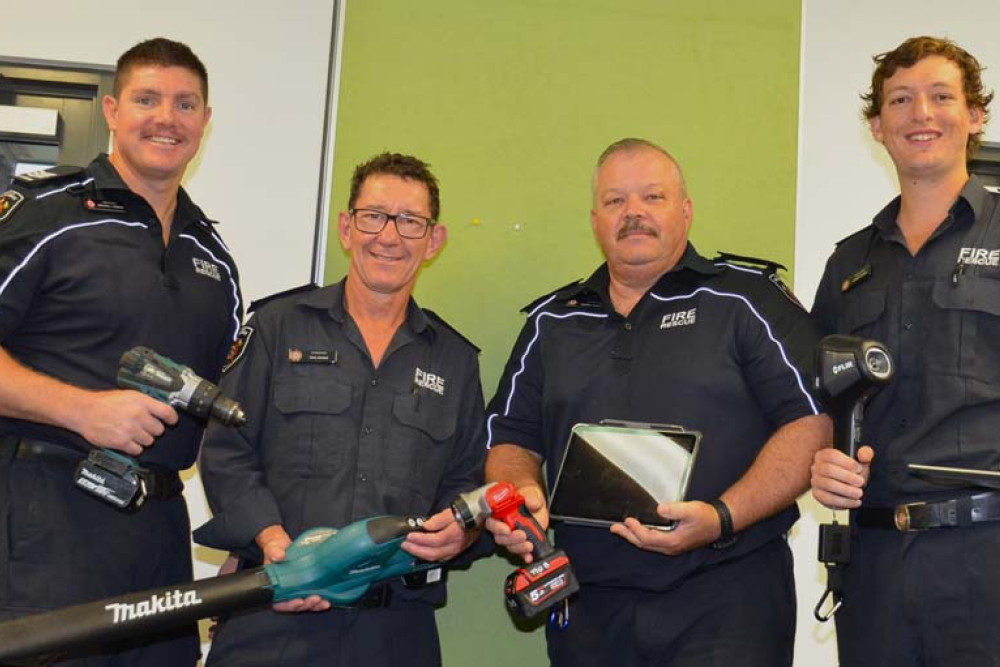Community & Business
9 May, 2024
Lithium-ion battery sparks safety concerns
A GROWTH in lithium-ion battery use has sparked problems throughout the community, with Mareeba firefighters urging people to stay vigilant when using and charging their devices.

Lithium-ion batteries are quickly becoming the most common battery used in a variety of products, including laptops, phones, portable chargers and power tools.
While the batteries allow for a quick charge and longer battery life, Mareeba station officer Darryl Chaplain said they have caused many houses and cars across the country to go up in flames.
“The main issues that stem from these batteries come from misuse and that could be because they are damaged or, in a vehicle for example, they are in a crash and the battery is exposed to heat,” he said.
“Also, if they are charged inappropriately and in extreme cases, they can overheat and start smoking up, and they tend to give off a huge flame that is very hard to contain.
“Another issue is overcharging. Continuing to charge a battery when it is full is a huge risk, and if you don’t have one of those that doesn’t automatically cut out when it’s done charging, then you can risk overhearing the device.”
When a lithium-ion battery overheats, it lets off a toxic fume which is can severely damage the lungs if inhales, and eventually starts a fire.
Mr Chaplain said he had already attended several lithium-ion battery fires, particularly in caravans during the hot dry season.
“There has already been a number of reports of fires due to lithium batteries in particularly caravans and other vehicles, where the battery has had to be removed and extinguished by us,” he said.
“Locally, we haven’t seen many household fires, but statistically, in Queensland, there are a lot of residential fires caused by these batteries.
“Last year, between 23 January and 23 September, there were 47 residential structure fires, eight non-residential structure fires and 38 other fires reported all to be caused by these batteries (in Queensland).”
“That is a pretty remarkable statistic.”
In the case of a fire caused by lithium-ion batteries, Mr Chaplains says people should immediately evacuate the room and avoid inhaling any fumes created by the fire and call Triple Zero (000).
“Don’t touch the battery as it may give off a flame or discharge at any time,” he said.
“Stay away from the toxic fumes and make sure everyone has evacuated from the area. Get outside and make sure everyone is safe until emergency service arrive.
“Try not to get involved with fighting the fire, and if you need to, use a powder extinguisher because in some cases, using water for these kinds of fires can cause a short circuit and make the fire spread even quicker.”
For more information about lithium-ion batteries, visit www.qfes.qld.gov.au/safety-education/battery-and-charging-safety/lithium-ion-battery-safety
How to charge your lithium-ion battery...
DOS
• Only use battery chargers that are specifically recommended by the manufacturer as being suitable for the battery or device.
• Only use chargers with the correct voltage and current for the device.
• Check that chargers bear the Regulatory Compliance Mark, to show they have met the relevant Australian Standards under The Regulatory Compliance Mark (RCM) (General) EESS (www.eess.gov.au/rcm/regulatory-compliance-mark-rcm-general).
• Ideally, they should be charged in a well-ventilated area such as a garage or car port.
• Allow time for batteries to cool down after use and before recharging.
DON’TS
• Avoid leaving batteries or devices unattended while charging and once the battery is fully charged, disconnect it from the charger.
• Devices and equipment such as power tools and e-scooters should not be charged in living areas.
• Do not leave devices exposed to heat or moisture.
• Do not charge batteries and devices on your bed, lounge or in direct sunlight.
• Never charge a battery or device that is showing signs of damage or is warm at touch.


